'The People v. O.J. Simpson: American Crime Story' Recap: Things Get Ugly

Warning: This recap for “The Race Card” episode of The People v. O.J. Simpson: American Crime Story contains spoilers.
Few things are as emotionally confusing as competing against a friend. As Americans we are raised to win, win always, win forever. But then we are also taught to always be loyal to our friends, have each other’s backs, treat each other with respect, junk like that. So what happens when you walk into the octagon and you’re suddenly nose-to-nose with a beloved mentor? Can you truly beat a friend within an inch of his or her life and still expect to meet up for drinks at Ruby Tuesday’s afterward? Mixed emotions!
Although almost any of the episodes could be titled this, “The Race Card” was this week’s episode of The People v. O.J. Simpson. Though we’ve all heard that phrase used to describe the courtroom tactic allegedly employed O.J. Simpson’s defense team, surprisingly it meant something different here. Was everyone aware of how vicious and race-based Johnnie Cochran’s relationship with former friend Chris Darden was? “The Race Card” continued to portray mid-’90s Los Angeles as an unsettled community and a hotbed of racist cops, but those concerns took a backseat to the inner struggle that Chris Darden seemed to be dealing with as a black man tasked to convict a black man whose defense had taken up a righteous cause against systemic racism. This case was never going to end in a beautifully eloquent, mind-changing monologue like something out of To Kill a Mockingbird, but this was the episode that things turned UGLY. But also real. Really real.
Let’s talk about it!

We began with a normal scene of a man being badgered by his daughters for a sweet treat. But it was all interrupted by a jerk on a motorcycle.

The jerk was a cop, and despite Flashback Johnnie Cochran’s calm, procedural-minded demeanor, the cop had him in handcuffs on the hood of his own car within SECONDS as dozens of Beverly Hills samaritans ate their fro-yo apathetically. An existential nightmare for anyone, but a chillingly commonplace one for Johnnie Cochran (and, you know, millions of other people).
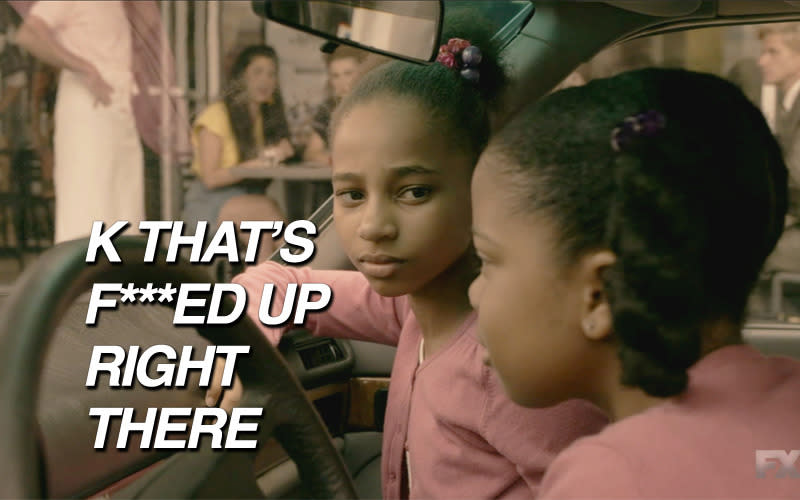
I liked that Cochran tried to turn the moment into a teachable one for his daughters, but ultimately he only got out of this situation by politely asking the cop to read his business card… “Assistant District Attorney.” Yikes! THIS was the world and context that made the entire O.J. trial possible. The city’s Assistant District Attorney was regularly pulled over by police for no ostensible reason other than driving while black in Beverly Hills. So this flashback provided a good explanation for what motivated Johnnie Cochran to distrust the LAPD with such conviction, but it did not explain why he’d spend the rest of this episode being a total dick, pardon my French.

It started with giving press conferences in which he accused his friend Chris Darden of being an Affirmative Action hire.

And it continued with Cochran’s strong-arming of the case away from Robert Shapiro, who had no choice but to throw hissy fits in the hallway before ultimately rejoining the group.
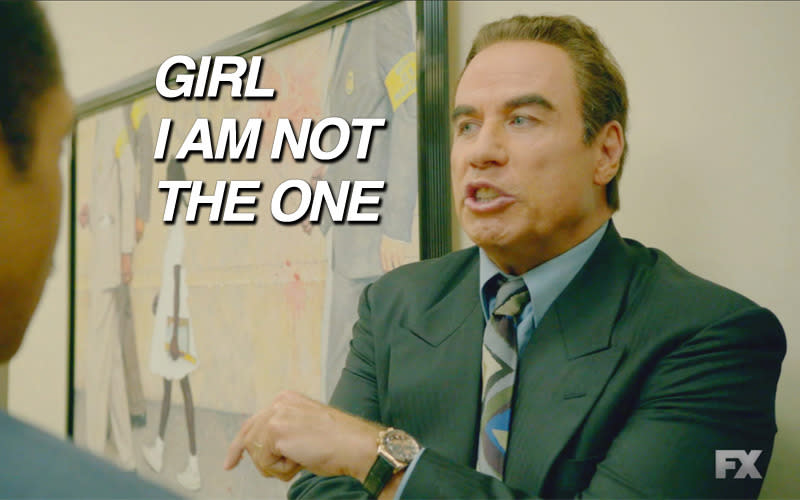
I loved when Shapiro singled out F. Lee Bailey by calling him “Judas” and F. Lee Bailey responded, “Why don’t you blow it out your ass, Bob?” These lawyers were CATTY and I was loving every second of it.
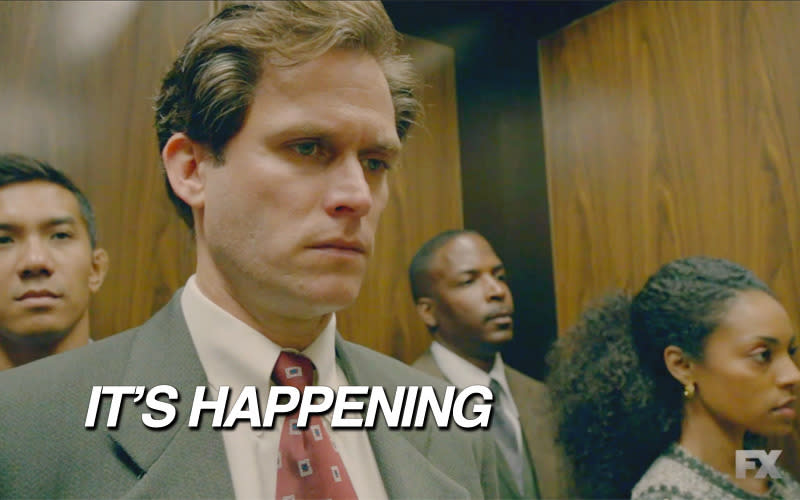
While we were treated to a montage of each side laying out their respective courtroom strategies, it was clear that one person was going to be a linchpin for each of them: Detective Mark Fuhrman. Marcia Clark seemed to think he was a crucial witness, but Cochran and his team seemed confident Fuhrman was the best way to prove the LAPD is full of corrupt racists. (I loved that when we first saw Fuhrman he looked visibly uncomfortable in an elevator surrounded by people of color. This show is not subtle, nor should it be.)
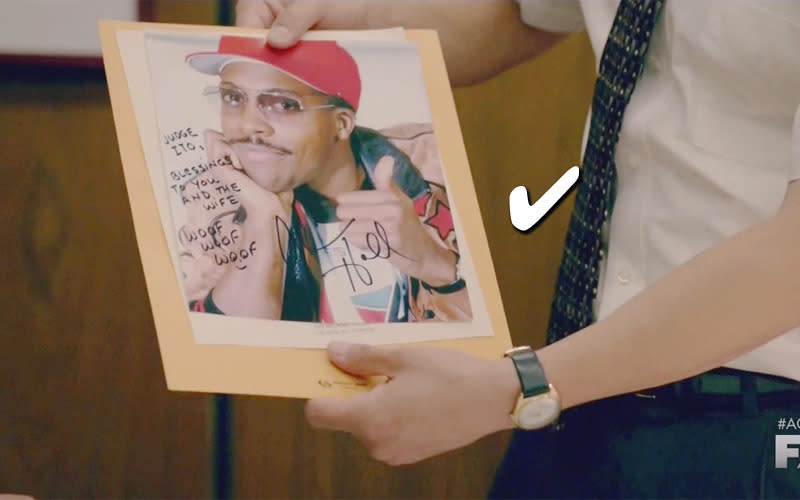
Oh man, so then Judge Ito had a quick pow-wow with Vanity Fair writer Dominick Dunne in which Ito fawningly offered Dunne a permanent front-row seat at the trial. But the kicker was when Ito excitedly and gingerly showed Dunne a signed headshot that Arsenio Hall had personally sent him!
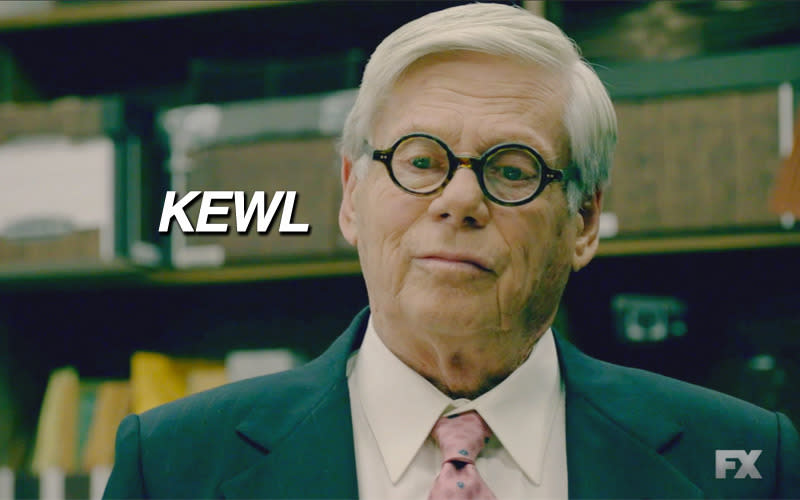
Dunne seemed slightly sickened by Ito’s obvious love of celebrity, but who among us WOULDN’T want that signed headshot of Arsenio Hall? In fact, it honestly wouldn’t even have to be signed to ME, it could be signed to Judge Ito and I’d still want it hanging on my wall. (Do you think Judge Ito still has it?) Anyway, one notable thing about this scene was that it was briefly mentioned that Dominick Dunne’s daughter had been murdered and her killer famously tried for the crime… But we all know her death was the first of the the so-called “Poltergeist curse” (Dominique Dunne played the older sister and was killed mere months after the movie came out) and now I think we may have a good candidate for SEASON 2 of this thing. Come on, Ryan Murphy. You know you wanna.
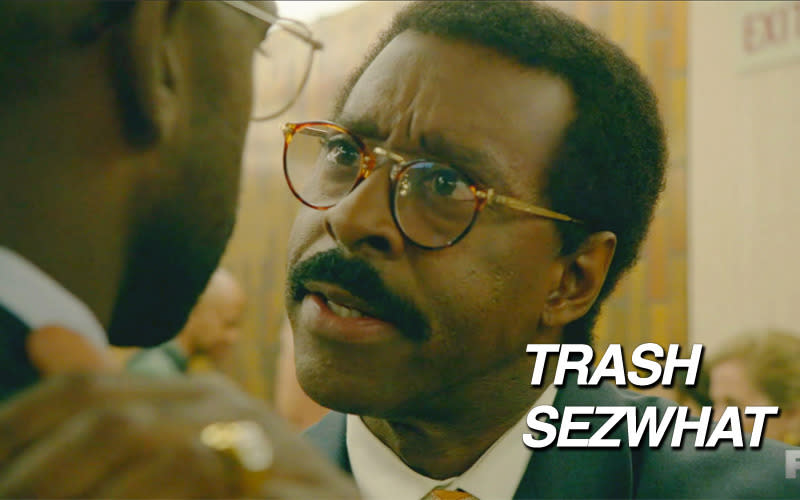
A pretty ugly scene soon followed in which Chris Darden appealed to Johnnie Cochran’s sense of friendship and assured him he would treat Cochran with respect. But then Cochran very sinisterly told him that respect was out the window… He wanted to WIN. You know, Johnnie Cochran is passionate and dynamic and sympathetic but in moments like this he was also pretty monstrous. Would not want to be on his bad side.
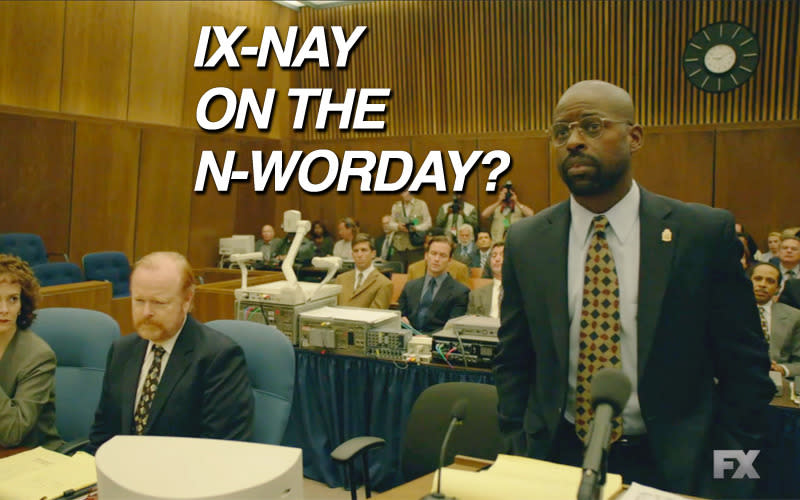
The ugly conflict between Darden and Cochran truly went nuclear during a pre-trial hearing in which Darden requested that the court ban any discussion related to the N-word (Mark Fuhrman’s casual use of which, it was anticipated, would ruin his testimony for the jury). Darden’s argument toed the line between empathetic and over-the-top, claiming that if black jurors heard that particular slur they would be blinded to facts and immediately side with the defendant. After Darden sat down even Marcia Clark was like “Yeeeeesh.” And then, of course, Johnnie Cochran stood up and DRAGGED him up and down the courtroom mercilessly before ending his fiery sermon by turning to Darden with a snarl: “N—–, please.” Good times!
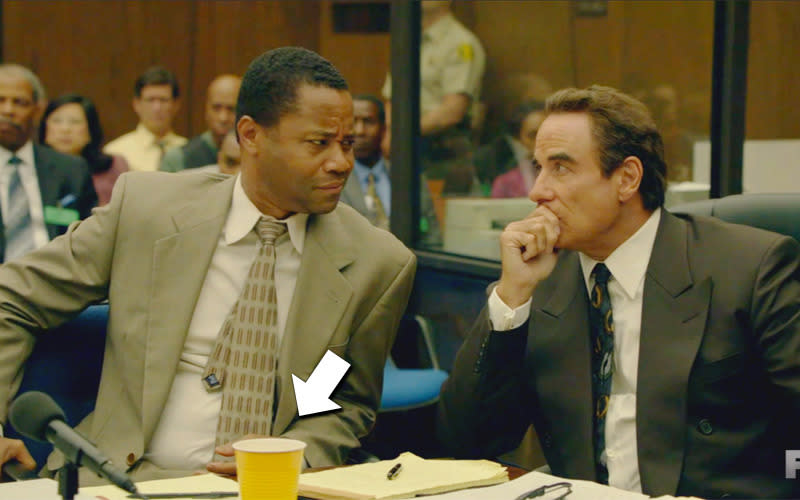
But if we’re being honest, it was hard to pay attention to the subtle nuances of each side’s arguments because I was too busy obsessing over the yellow plastic Solo cups that the Defense were drinking out of. Yellow plastic Solo cups? What was this a spring sorority mixer? They looked so fun and festive!
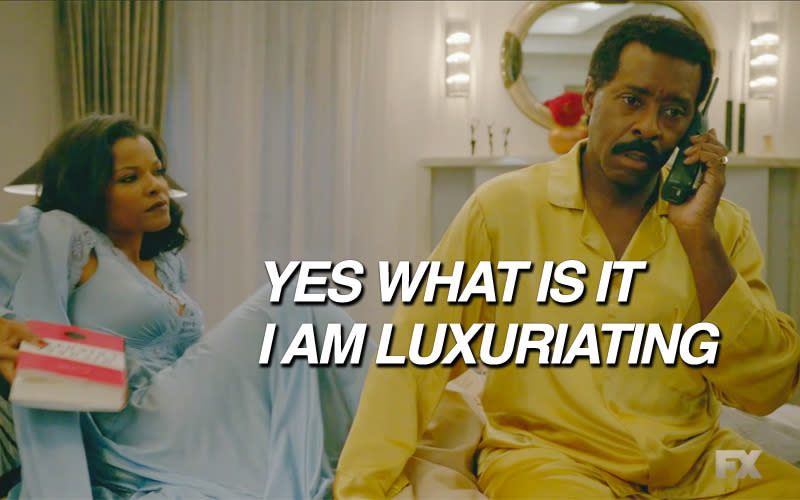
But nowhere near as fun and festive as Johnnie Cochran in his yellow silk pajamas. Apparently when he wasn’t out shaming his peers and using his formidable skills and sense of righteousness to exonerate wealthy, guilty men who didn’t deserve it, he was an EXPERT at relaxing in style. In this scene he was rehearsing his opening statements with his wife (and really beefing up the rhymes and alliteration, his actual secret weapons) and was interrupted by an associate who wanted him to know that they’d forgotten to submit a ton of witness names to the court and could therefore no longer call them. So what did Johnnie Cochran do? The next day he stood up in his opening statement and talked about those witnesses anyway! The Prosecution had no choice but to have a literal heart attack.
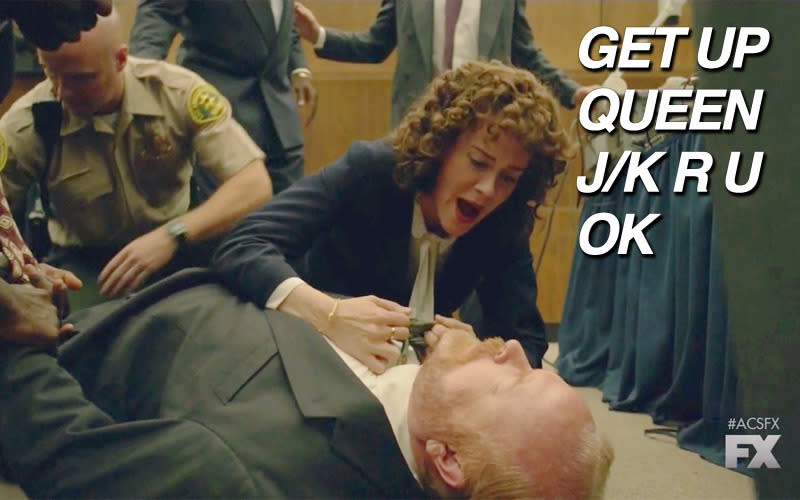
This was Bill Hodgman, who according to this episode became so frustrated and upset by Cochran’s shenanigans he actually collapsed and had to quit the case. Although Marcia Clark’s opening statment had been to the point (’there was tons of blood evidence, O.J. obviously did it, duh’) she was still outshined by Cochran coming out and quoting Martin Luther King, Jr. right off the bat. Add to that this heart attack situation and the prosecution was not off to a great start.
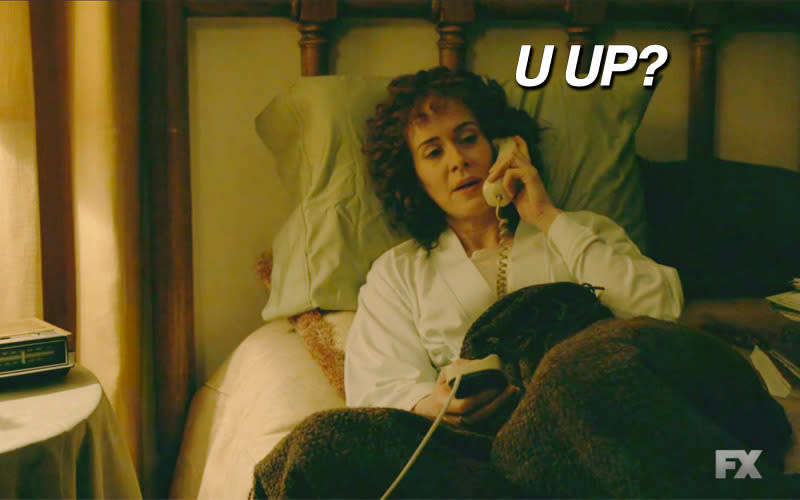
I loved later on when Marcia Clark booty-called Chris Darden in the middle of the night to promote him to co-prosecutor. (Well okay fine, it wasn’t a sexual call, but it WAS very steamy in my opinion.) This was a nice moment because all episode Chris Darden had been working up the courage to ask Marcia if he’d been assigned this case because of the color of his skin or not, and she finally just had to assure him that she thought he was very A+ and also she had total heart-eyes while saying that. Anyway, he took the promotion but not without feeling kinda stressed about it. This whole thing was not going well for him, and he knew it.
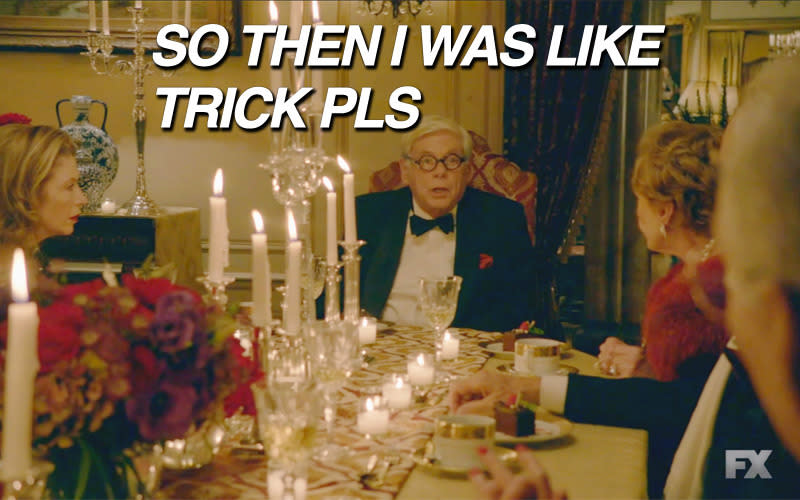
I loved this device of Dominick Dunne regaling a dinner party of extremely wealthy white people with all the gossip of the day regarding the O.J. Simpson case. He was obviously of the belief that O.J. did it, and there was a chilling moment when his tuxedo-clad servants (most of whom were people of color) served dinner and the entire party fell silent until they’d exited. Can’t be talking about racial matters in front of the help! But yeah, this scene was so weird and fascinating. I really hope it becomes a regular thing.

Probably the biggest (and lowliest) thing that happened in this episode was when Johnnie Cochran decided to replace all the photographs and art in O.J.’s mansion with pieces that would appeal to the mostly black jury. That meant removing Nagels and framed photos of O.J. with white strippers and replacing them with African masks, photos of O.J.’s mother, and also a framed photos of complete strangers. (As a chilling counterpoint, Nicole Brown-Simpson’s condo had been cleared out completely, leaving a cold blank canvas for the jury to inspect.) So yeah, when the jury arrived for their field trip, they couldn’t help but be impressed and delighted by everything they saw.
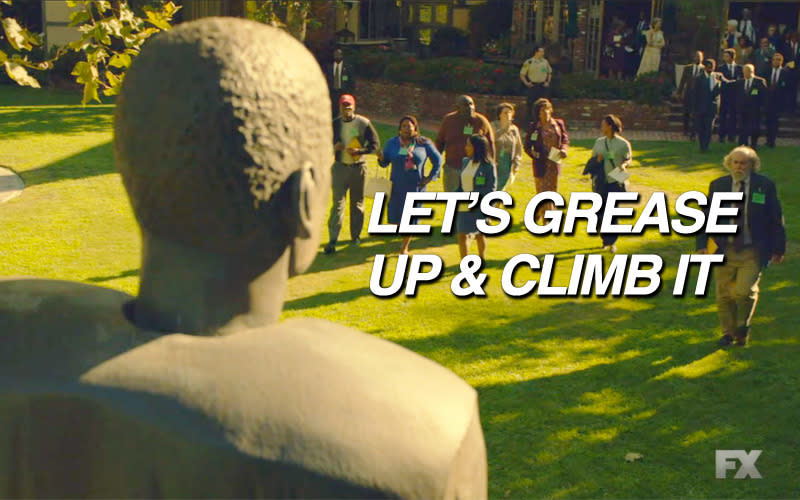
In retrospect, it was maybe not the best idea to treat the jury to a free day at a celebrity-themed amusement park? One of the male jury members even posed next to O.J.’s Heisman trophy admiringly. How were they NOT going to come away awed by O.J.’s wealth and lifestyle?

Even O.J. seemed slightly annoyed by this whole charade. Despite having earlier agreed to Johnnie’s request that he go with the flow and do whatever it took to play the part of beloved icon, O.J. still looked kind of hurt that all his personally selected artworks had been taken down. Finally, he couldn’t help but blow up at Chris Darden for daring to gaze despairingly at his koi.
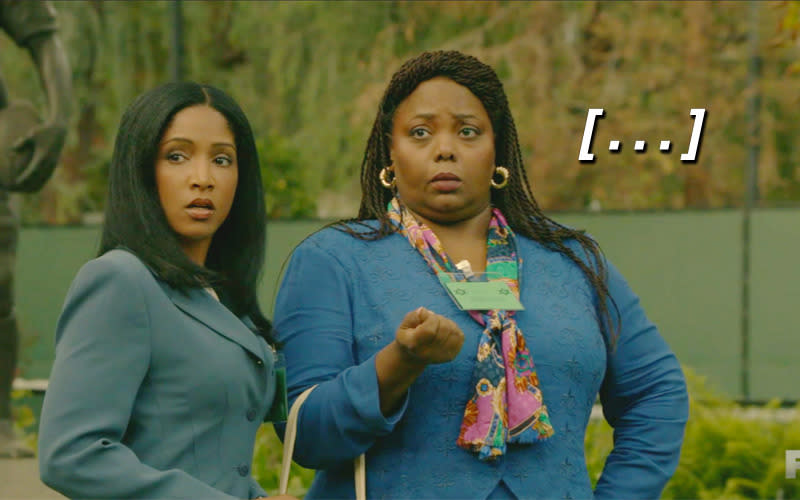
I loved that the jury witnessed this outburst, but let’s be real, if they were falling in line with the polling Chris had been subjected to, they were in the 70 percent of black Americans who did NOT like him either. Poor Chris Darden.
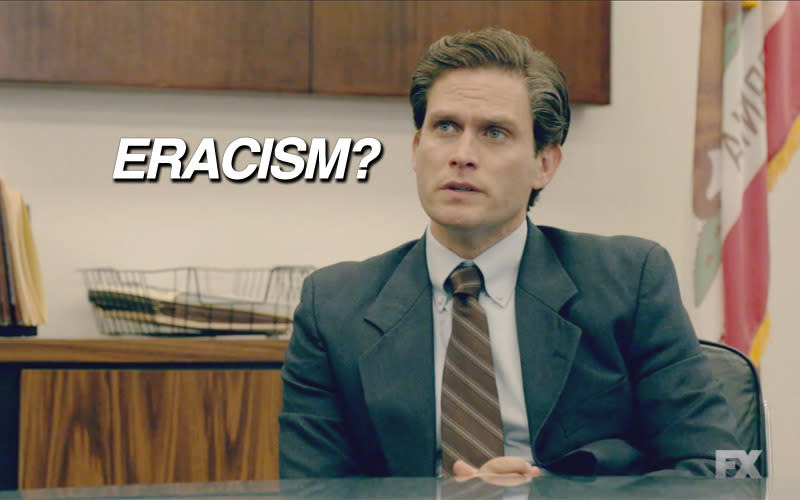
One of Chris Darden’s big dilemmas in this episode was whether or not he should be the one to vet Mark Fuhrman for the witness stand. Marcia sort of demanded that he do it, but Fuhrman was giving off too many psycho vibes and Chris didn’t think they should have him testify at all. But then Johnnie Cochran himself told Chris he should “let the white people” do it, and Chris’ father agreed with Johnnie. All of this is to say that letting ostensibly “polite” Mark Fuhrman testify was probably going to be a problem, and as the final shot of the episode revealed, Fuhrman’s hobby of collecting “World War II memorabilia” was probably not a great sign:
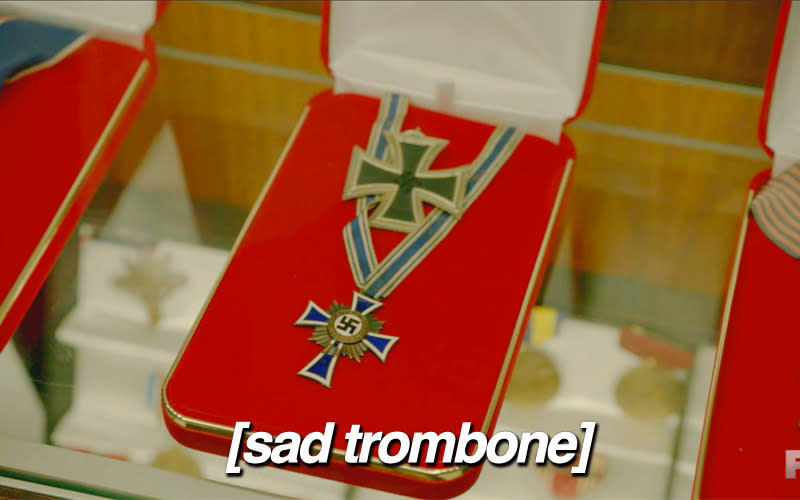
HAHAHAHA. Oh man. That is terrible. But honestly it’s not just Mark Furhman… Anytime ANYONE tells you they collect “World War II memorabilia” make sure to follow up with “Ok but which side?” It’s a pretty important question in my opinion.
Ultimately the appearance of a surprise swastika was not out of character for this episode, an episode titled “The Race Card.” Things have begun to get ugly for our characters, which we should have known was coming. This wasn’t exactly the most FUN episode of television ever produced, but it was excellent. So much conflict, so many competing motives, such a flawed system. Whether The People v. O.J. Simpson will ultimately provide catharsis or simply rip open old wounds is anybody’s guess. But for now it continues to feel important and necessary.
What did YOU think of “The Race Card”?
The People v. O.J. Simpson: American Crime Story airs Tuesdays at 10 p.m. on FX

